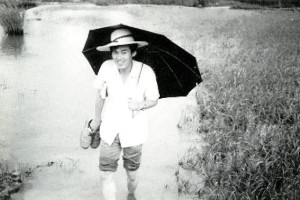 Shin Kyung-sook’s Please Take Care of Mom, an “Oprah-genre book” and one of Amazon’s ten best fiction books in 2011, was for many American readers their first exposure to Korean literature. The novel’s focal point is the traditional family, heterosexual relationships, fixed gender roles, and conservative middle-class values—a portrait of Koreans as they like to see themselves and to be seen by the outside world. As Korean publishers promote writers who stick to the comfort zones of nationalism, family, and traditional values, and as the Korean government promotes the translation of only the novels that it wants the world to read, GLBT Korean writers are still waiting to be discovered.
Shin Kyung-sook’s Please Take Care of Mom, an “Oprah-genre book” and one of Amazon’s ten best fiction books in 2011, was for many American readers their first exposure to Korean literature. The novel’s focal point is the traditional family, heterosexual relationships, fixed gender roles, and conservative middle-class values—a portrait of Koreans as they like to see themselves and to be seen by the outside world. As Korean publishers promote writers who stick to the comfort zones of nationalism, family, and traditional values, and as the Korean government promotes the translation of only the novels that it wants the world to read, GLBT Korean writers are still waiting to be discovered.
But there is always hope. It seems the first Korean same-sex writer to reach a global audience will be Gi Hyeong-do (1960–1989), a well-known poet to Koreans who famously died at age 29 in a gay sex theatre in Seoul’s hidden gay district. Away from public view, Gi’s poetry has been a source of identification for the country’s gay male community for over twenty years, even as all sex-related implications of his death have been studiously overlooked by the mainstream literary establishment. The result of this cultural blind spot has been a decades-long refusal by mainstream critics to link the sexual implications of Gi’s death with his poetic oeuvre. But with his poetry’s publication in two major foreign languages set for later this year, this situation may be rectified.
The 100 poems comprising this poet’s life work describe a world of alienation, pessimism, and despair. Korean critics have called Gi a “poet of death.” The fact of his untimely death, the dark themes in his work, and the posthumous debut of his poetry collection have contributed to a singularly funereal reading. But those who knew Gi were dumbfounded by the darkness of his poetry. In the words of one of Gi’s colleagues, in real life “he brightened his surroundings with pleasurable jokes, crafty fussiness, and witty chatter. … The overwhelming despair in the poetry of that good young man really bewildered me for a time. … To the friends who were around him, including me, his poems were exaggerations or imaginative fictions, and seem like a betrayal of the person he showed to us in reality.”
The explanation for the stark contrast
between the poet’s cheery exterior and the melancholy of his poetry is hinted at in wry allusions to same-sex sexuality in his love poems, and in depictions of a dismal, alternate existence reflecting an underground consciousness—themes that none of the critics has bothered to notice. In the poem “Old Book,” for example, the poetic voice is an old tome that no one reads for long, or tries to understand. Abandoned by those who would covetously “insert their bookmarks into him,” he seethes with pessimism. In another poem, Gi conforms to societal secrecy while bemoaning the difficulty of finding love in a world of fleeting relationships.
What did you do, Mr. Gi Hyeong-do? I tried to build a house. Whose house? Hm, well, I don’t know. Then did you tear it down? Oh, no, I didn’t ever build it. What? No, no. Well ……… like when you chew gum so much you feel embarrassed or you feel empty. … Last Spring I had a lover. Did your lover go away? No, just disappeared. A flickering light. Nothing but a memory of a red dawn at summer that invaded and made me queasy. Try falling in love, you say? Try falling in love. Can you imagine a summer with no rain? It’s not because of the rain. That’s right. By the way, is there something to eat?
When desires are forced to inhabit a world of secrecy and invisibility, logic and rules come to seem a joke. Gi everywhere reproaches his society with its “unwritten laws,” as well as the heartless world of an underground love life to which he is “stuck like a thumbtack.”
Yet amid the angst and complications of life, Gi can also share tender, sincere moments in which desire for the lover is expressed in language evoking the breathy verse of Rumi or Tagore:
I am lonely. My friend, when the soft sound of my cough slips into the sketches of your sleep, light a small lamp and place it at the windowsill. The distance of my desire is too great, and silence always has me in its grip. You must open the window only when it is very late. The flame’s light is too faint and will not reach the field. You, with your head tilted to one side—how I have longed to enter into your sighs! Ah, soon you will extinguish the leaf of flame with a stream of your breath. I break the smallest branch without making a sound. I will hide my body behind the branches and quietly gaze at the remote area of existence where I can never go—until that dim hour when you rub the globe of your weary lamp, until some movements stop in the misty darkness, and the tired wind quits its brief repose.
The allusion to the “remote area of existence” will not be lost on gay readers, nor will the absence of a single instance of a female love object in any of his poems (there are only male or ambiguously-gendered love objects). Korean critics have taken the dark, “grotesquely real” side in a dozen of “safe” poems to represent the entirety of Gi’s poetic world, and no mention is made of love themes. But it is from the unity of the two sides of the poet, love and darkness, that his ultimate truth emerges. Consider “Flower,” in which the male chest is the necessary interpretation, flat and “stitchable”:
On days when my soul bursts into flame
I will stand as a flower
in the garden of your sickened heart,
and become the blood you hotly spit up
throughout the night
I don’t care if I’m snipped in my middle
if it’s by your hand
I will stitch up your chest with my deep
breaths
If I can place my head where the winds blow
I won’t care, even if I fall asleep standing up.
Or in “Grass”:
I have an appendix but
I don’t like eating grass
I am
a poor excuse for an animal
I live as a spirit pitched to and fro
roaming clouds streaming with sleep
baring the veins on my wrists
a long sorrow
When I take my body, empty, and stand
before you
your waving gestures
are signals so green it makes me sad
Ah,
but the love you retched up while guarding
the night!
Was that your beautiful soul
that sustained the darkness, erected the blades?
Now I shall take root!
Better to be grass, having to cry smiles
Let’s suffer life’s afflictions
Let’s bind our feet together and sob
When the winds blow on clear days
and lightly caress my bruised sides
my song, which delves into my heart,
springs up, and becomes you
will form groups, crisp and fresh,
and float in the air.
Moving beyond traditional stereotypes in Korean literature must involve an expansion of themes and genres to embrace sexual diversity, crossing the boundaries of “culturally comfortable” tropes in favor of more challenging, nuanced topoi. Bringing Gi and Korean gays into the visible side of translation may be an important step in that direction.
The real tragedy of Gi’s death, perhaps, is that, had he lived, he might have developed into Korea’s greatest “gay bard.” If we view Gi’s final poems as his most “mature,” we also find many of them are also the most direct and poignant, as well as the most “political,” notably his poem “Slur,” which refers most directly to the underground gay community. It’s clear that from mid-1988, Gi was undergoing a significant change in consciousness, as described in his travel essays and personal correspondences. These changes were probably conditioned in part by the new cultural promises on the horizon after 1987, as a newly democratizing Korea lay on the cusp of a new wave of liberalization, including GLBT identity—a wave that, sadly, Gi would never ride to shore.
Gabriel Sylvan founded the Korea Gay Literature Project in 2004 and currently researches Korean same-sex literature and history at Seoul National University.






